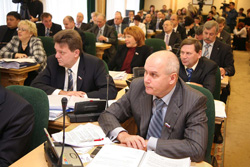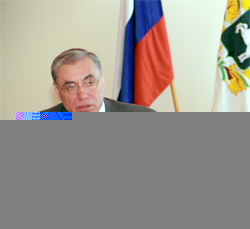|
The Legislative Duma of Tomsk Oblast
March 25, 2010. XXXVII Session of the Tomsk Oblast State Duma As always, Boris Maltsev, Speaker of the Tomsk Oblast State Duma, opened the session (opening speech). As always, Boris Maltsev, Speaker of the Tomsk Oblast State Duma, opened the session (opening speech).
The deputies made amendments to the Tomsk Oblast Law On allocation of inter-budgetary transfers. The changes were made in order to provide local budgets with funds to pay the Governor’s scholarship to the best instructors of Tomsk Oblast. It is a 4200 rubles monthly scholarship to be paid from April 1, 2010 to 10% of the best instructors.
The deputies also amended the Oblast target program Development of innovation activity in Tomsk Oblast in 2009-2010. The changes reflect a federal loan of 1.132bn rubles recently obtained by Tomsk Oblast in order to finish road construction activities for Tomsk Special Economic Zone.
Amendments were made to the Oblast Law On cultural heritage (historical and cultural monuments) of Tomsk Oblast. The powers of the Oblast Department of Culture related to preservation, utilization, and promotion of the monuments owned by the Federation are suspended until January 1, 2011 due to absence of federal financing. However, the Department will still ensure national protection of the monuments. Andrey Kuzichkin, Head of the Department of Culture, thanked the deputies for the legal support for the cultural sphere and expressed special thanks to twenty deputies who ‘along with moral and legal support provide financial assistance for cultural projects.’
The deputies passed amendments to the Law On 2010 Oblast budget and planning period of 2011 and 2012. Total budget revenues remain unchanged and expenses grow by 1,239.6m rubles. Alexander Fednev, Head of the Oblast Department of Finance, appealed to the deputies to back the Administration’s proposal to take out a budget loan for road construction and maintenance. Also, 74m rubles will be paid to the best instructors of the Oblast as the Governor’s scholarship. Finally, Mr. Fednev said that the amendments include all agreements reached at the session of the budget conciliation committee in connection with the support for the Football Club ‘Tom’.
The amended Oblast budget revenues in 2010 are 25,950m rubles, and expenses 27,290 rubles, deficit 1,340m rubles or 7.07% of the budget revenues not counting non-repayable receipts from the federal budget. The upper limit of the government debt of Tomsk Oblast as of January 1, 2011 will be 8,341m rubles of 44.05% of the revenues.
The deputies amended the Oblast Law concerning specialized housing. The amendments coincide with the forthcoming celebration of the 65th Anniversary of the Great Victory to provide support for the WWII veterans. In the revised Law a new category of citizens is mentioned – disabled WWII veterans. They are now also eligible for housing. Besides, the changes give to the veterans, disabled veterans and widows (widowers) of the killed (deceased) participants in World War II who are currently on the waiting list for specialized housing of Tomsk Oblast, the House of Veterans, a priority to be the first to move.
A new power was conferred on the regional parliament and fixed in the Oblast Statute: the Oblast deputies will hear the Governor’s report on the performance of the executive authorities, also with regard to the issues set by the Tomsk Oblast State Duma. A detailed description of the process how to prepare the Governor’s report which would provide answers to the Duma questions is contained in the Oblast Duma Rules of Procedure.
The changes reflect a procedure for interaction among authority branches. A major change is the Governor’s new duty to report on the issues raised by the Tomsk Oblast State Duma. The provision concerning the annual Governor’s report has been in the Statute for a long time, and each year the head of the region delivers his Message to the deputies telling about the situation in the Oblast and socio-economic development plans. From now on, each year in April the Governor will answer the questions set by the Duma.
The questions will be collected in the following manner. Each party faction and each Oblast Duma committee will send their questions to the Governor to the Legal Committee before March 10. The Legal Committee together with the faction leaders or other representatives will compile a question list which should be approved in the final revision by the Duma Council and submitted for the Governor’s consideration. In April the deputies’ questions should be answered.
In the second reading the deputies adopted amendments to the Law On basic guaranties of children’s rights in Tomsk Oblast. In accordance with the amendments, the places where children are prohibited to be without parents at night will be determined by representative bodies of the municipal entity based on an expert commission’s opinion. The deputies were mostly concerned about the effectiveness of the established “curfew” hours. Grigory Shamin, Chairman of the Legal Committee of the Tomsk Oblast State Duma, stressed that the Law is effective, indeed.
‘The Law was circulated at schools, he said, and its provisions were explained both to parents and children. Moreover, after adoption of the Law the rate of crimes and offenses involving juveniles in the region on the whole and in certain municipal entities reduced by 13%.
The deputies unanimously approved the report by Sergey Nikitenko, Chairman of the Audit Chamber of the State Duma of Tomsk Oblast, on the performance of the Chamber in 2009.
In the reporting year the Audit Chamber carried out 20 field audits and expert and analytical reviews related to checks of intended and efficient utilization of budget allocations and public and municipal property. The Chamber analyzed the data collected and made recommendations to improve efficiency of budget spending.
Under representations submitted 18 officials were held liable for disciplinary action. The materials on 8 audits in 2009 and 3 audits over the preceding years were handed over to the law enforcement bodies.
Based on the Audit Chamber’s comments and proposals 4 legislative acts of Tomsk Oblast were amended, 12 passed, and 4 are in progress. The amount recovered to the regional budget in the reporting year totaled 20.8m rubles. The recovery process is still under way; it is planned to deliver 14.3m rubles more to the budget system.
In 2009 the Audit Chamber audited the amount of almost 11bn rubles. It identified 376 violations of the current legislation for the estimated amount of 886m rubles.
In the second reading the deputies adopted amendments to the Law On municipal elections in Tomsk Oblast. The changes bring the regional bill in compliance with the federal legislation. Under one of the amendments specific dates for municipal elections were established. Also, the document stipulates a procedure for allocation of free-of-charge television broadcasting time by lot.
The deputies approved a new procedure for compiling the list of candidates nominated by the parties for municipal elections. Those changes were initiated by the Election Committee of Tomsk Oblast.
Until now, the process of municipal elections was based on a closed list system which us not transparent for the voters. Sometimes people vote for certain candidates on the list but the deputy seat is given to different candidates who were among the last on the list. It happened because the Election Committee registers the whole list of a political party and that list is then used for allocation of deputy seats if the party overcomes the 7% barrier. In fact, none of the candidates is concerned with the interests of voters from a specific municipal entity or the municipal entity itself.
Under the new rules party candidates will be divided into territorial groups. The deputies believe that this measure will ensure that party candidate lists include the most active, respected and smart people with good reputation in a specific sphere of life of the municipal entity.
From the voter standpoint nothing has changed. They again choose deputies in single-member constituencies and the party they want to support. And from now on, the party in the voter’s constituency is represented by certain candidates. If a person was elected a deputy and has that position for any reason, the deputy seat will be taken by the second person on the party list for that constituency.
With the new system the total number of candidates will not change. The deputies pointed out that the election process will benefit a lot from the above changes. Because such division of candidate lists into territorial groups will stimulate the candidates’ activity for the voters in a particular territory and increase the community involvement into elections. They do not have to vote for the whole party list but for specific candidates from their constituency. The new system will be implemented for the first time during the forthcoming elections to the Tomsk City Duma this fall.
 Boris Maltsev, Speaker of the Tomsk Oblast State Duma, held a traditional press-conference for journalists during the break.
In his answers to the questions from the media the Duma Speaker put particular emphasis on two ideas.
Boris Maltsev, Speaker of the Tomsk Oblast State Duma, held a traditional press-conference for journalists during the break.
In his answers to the questions from the media the Duma Speaker put particular emphasis on two ideas.
The first idea was about the causes of growing public discontent. The Speaker believes that such moods are triggered by the economic situation with growing unemployment numbers and decreasing welfare. Hence the conclusion: economy is the starting point. Without large scale factories and plants an economy where the country and its citizens prosper cannot be created.
The second idea was about the possible outcome of the public discontent.
‘One of the demands put forward by the organizers of the Day of Anger (in Tomsk this protest action is scheduled for March 27) is full democratic freedom,’ Boris Maltsev said. ‘And they have grounds. We no longer develop democratic principles in state government. And I personally think that it is not right. Take the deputies who are being more and more restrained from real power. Over the last 7-8 years the weight and influence of the representative authorities have been down graded. We can feel it at the level of our Oblast Duma. Heads of representative authorities were ‘expelled’ from the Federation Council; we were deprived of the right to appoint judges, heads of internal affairs departments... The administrative authorities rule the country today sitting in Moscow, regions and municipal entities...
Yet, we have to agree that the President Dmitry Medvedev is taking measures to improve the situation. Stricter control over the election system has been put in place. Laws are amended in a way to allow parties not represented in the parliament to take part in the sessions of legislative bodies. Regular governors’ reports for the legislative assemblies have been put into common practice. So, we can actually see that full democratization is becoming closer.’
|
|

|



